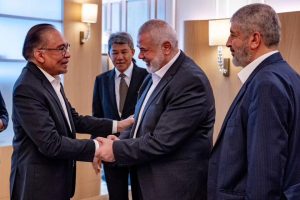Malaysian leader Anwar Ibrahim yesterday met with top Hamas leaders in Qatar, just days after American officials visited the country to discuss concerns that Iran was raising funds for regional proxies, including the Palestinian militant group, in the country.
On the last day of a three-day visit to Qatar, during which he attended the Qatar Economic Forum, the Malaysian leader met with a Hamas delegation led by the group’s political chief Ismail Haniyeh and former chairman Khaled Mashal.
In a Facebook post yesterday, the Malaysian leader said that he praised Hamas for its willingness to release hostages, and called on the Israeli government to release all Palestinian prisoners and agree to a peace plan. “Malaysia will remain committed to play its role on the international level for an end to the attacks on Rafah,” Anwar wrote in the post, referring to the city in southern Gaza that is currently under siege by the Israeli military.
During the meeting, he also “requested Hamas to consider the views of various parties to seek a speedy and peaceful settlement of the Gaza conflict,” according to a report by the Malaysian state media agency Bernama. The report said that Anwar also discussed the conflict with two top Qatari leaders, Malaysian news outlet Bernama reported.
The trip to Qatar came just days after a delegation from the U.S. Treasury Department, including Brian Nelson, its chief sanctions policy, visited Malaysia in order to discuss its concerns that Iran is using Malaysian entities to finance militant groups, including Hamas. During the meeting, Home Minister Saifuddin Nasution Ismail said that Malaysia would not recognize economic sanctions imposed by the U.S. on Iran, and would only help enforce sanctions authorized by the United Nations Security Council.
Anwar has been harshly critical of Israel since the outbreak of the current conflict. Speaking at a large pro-Palestine rally in Kuala Lumpur several weeks after the Hamas assault on southern Israel, Anwar described the ruthless Israeli response as “the height of barbarism in this world,” and called on Israel to end its occupation of Palestinian territories.
Where Anwar has set himself apart from other national leaders who have criticized Israel since the beginning of the conflict is his willingness to engage openly with Hamas, which Israel, the U.S., and many Western nations view as a terrorist organization. In October, shortly after Hamas’ brutal incursions into southern Israel, he took a phone call with Haniyeh in which he expressed Malaysia’s unwavering support for the Palestinian people.
This reflects a social and political consensus in Malaysia, where there is strong support for the Palestinian cause and senior Hamas officials have long received a warm welcome from Malaysian politicians. This is the first face-to-face meeting that Anwar has held with Haniyeh since taking office in late 2022, though he did so on a number of occasions during his time in opposition.
In some sense, then, yesterday’s meeting can be viewed as a declaration of independence from Malaysia’s Western partners, particularly the United States, who have expressed concerns about his continued engagement with Hamas.
In many ways, this is a domestic political necessity for Anwar, who claimed last year that he has come under U.S. pressure to cut his country’s ties with the Palestinian group. After all, the only thing worse politically for the Malaysian leader than being outflanked on Gaza by his right-wing Malay-Islamist opponents is being seen to capitulate to Western pressure to moderate the country’s support for the Palestinian cause. “You don’t tell me who I should meet, or who I should not,” Anwar said during a Q&A session with Bloomberg News during the Qatar Economic Forum.
In the Bernama report, Anwar struck a more conciliatory tone, recognizing that the meeting would be viewed as controversial by his Western partners. “Our approach is to be in contact with the political body of Hamas and not get involved in any military activities,” he was quoted as saying. “So, this is what we want to clarify and which I believe our [Western] friends will raise.”

































